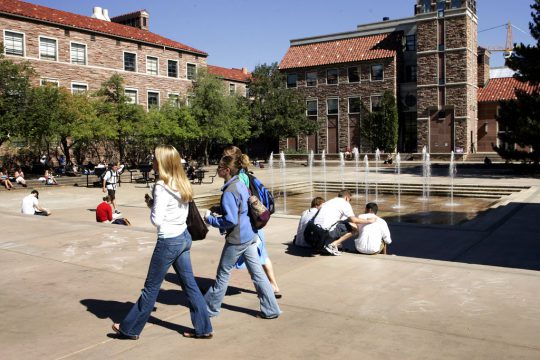
DENVER | Colorado made news in May as the first state in the nation to ban legacy admissions at its public colleges. But few colleges in the state even consider an applicant’s family ties to a school, so what does the law really change?
The answer, advocates say: perception.
They hope the law especially helps people of color, as well as low-income and first-generation students see these institutions as open to them.
Supporters believe the ban on legacy admissions makes a statement about who Colorado values in being admitted into college and clarifies the role of family ties to a school.
Sarah Staron, a University of Colorado Denver graduate student, helped push for the bill because of the weight she believes perception plays in college applications. She recalls classmates wondering in lunchroom conversations whether having a family member who went to a university meant better odds in being admitted. That speculation can keep certain students from applying, she said, and the perception that legacy admissions ensured you were a shoo-in to a school.
The new law sends a clear message, Staron said. “We are saying that we will not stand for inherited privilege in Colorado.”
In reality, family ties are rarely a factor in admissions at the state’s public colleges. Eight of the 12 institutions officially do not consider family ties. The other four — Colorado State University, the Colorado School of Mines, Colorado Mesa University and Western Colorado University — report they consider those ties. They also admit most of the students who apply.
In fact, Colorado State, Western Colorado, and Colorado Mesa accept roughly 4 out 5 applicants. Mines accepts about half of all students who apply.
Nationally, legacy admissions play a role at wealthy private universities, where fewer than 1 in f5 applicants get in.
Richard Kahlenberg, an expert on admissions, said legacy admissions have huge consequences. He pointed to research that found that about half of leaders in U.S. business and government come from just 12 wealthy higher education institutions.
That’s why, he said, “an unfair admissions policy like legacy preference matters.”
Even if few Colorado schools use legacy admissions, Kahlenberg said the law sends a powerful message about which students should go to college.
School leaders across the state supported the bill. Several had changed their policies. The University of Colorado Boulder and the University of Northern Colorado, for instance, ended the practice in the past two years.
Clark Brigger, executive director of admissions at CU Boulder, said in a written statement that the school removed legacy admissions at the same time it made national standardized testing scores optional. The state legislature also approved a bill this year that makes the ACT and SAT optional in college admissions.
Since the changes, Bridger said applications have risen 24% among students of color and 11% among first generation students.
Even schools that do ask about an applicant’s family connection claim that they do not consider that information in admissions.
Heather Daniels, director of admissions at Colorado State University, said the school asks applicants about alumni in their family simply to collect the data.
Western Colorado University spokesman Chris Rourke said the school doesn’t use alumni connections as a top consideration in admissions.
Advocates said that even admissions staff themselves are confused about the role of alumni connections in admissions.
In surveying schools earlier this year, Staron found that some administrators could not clearly state how alumni relations weighed into admission offers, even at schools that claimed to have ended legacy admissions. Staron was working with Young Invincibles, a national nonprofit organization that helps young adults advocate on higher education, health care, and workforce issues.
“We don’t want to imply that our colleges or admissions officers are in any way bad actors,” Staron said. “But unless you actually run a bill to say we’re prohibiting this practice, those policies can sometimes just exist in perpetuity.”
Prateek Dutta, the policy director for Democrats for Education Reform, also found inconsistencies in how schools reported using family data.
“That illustrates a thumb on the scale for those who have family connections,” Dutta said.
With the law in place, advocates see opportunities to increase college-going rates for students of color and those that are low income and the first in their family to go to college.
Kahlenberg said real change would involve: giving more weight to the background of students who have disadvantages.
Staron said she hopes the state now tackles affordability and unconscious exclusion. Staron believes that the law could change how students view their chances of getting into college.
“I really believe this is going to get more students in the door,” she said. “This is more than symbolic.”
"really" - Google News
June 14, 2021 at 12:03PM
https://ift.tt/3iEhX7l
Colorado banned legacy admissions. But what does that really mean for students? - Sentinel Colorado
"really" - Google News
https://ift.tt/3b3YJ3H
https://ift.tt/35qAk7d
Bagikan Berita Ini














0 Response to "Colorado banned legacy admissions. But what does that really mean for students? - Sentinel Colorado"
Post a Comment